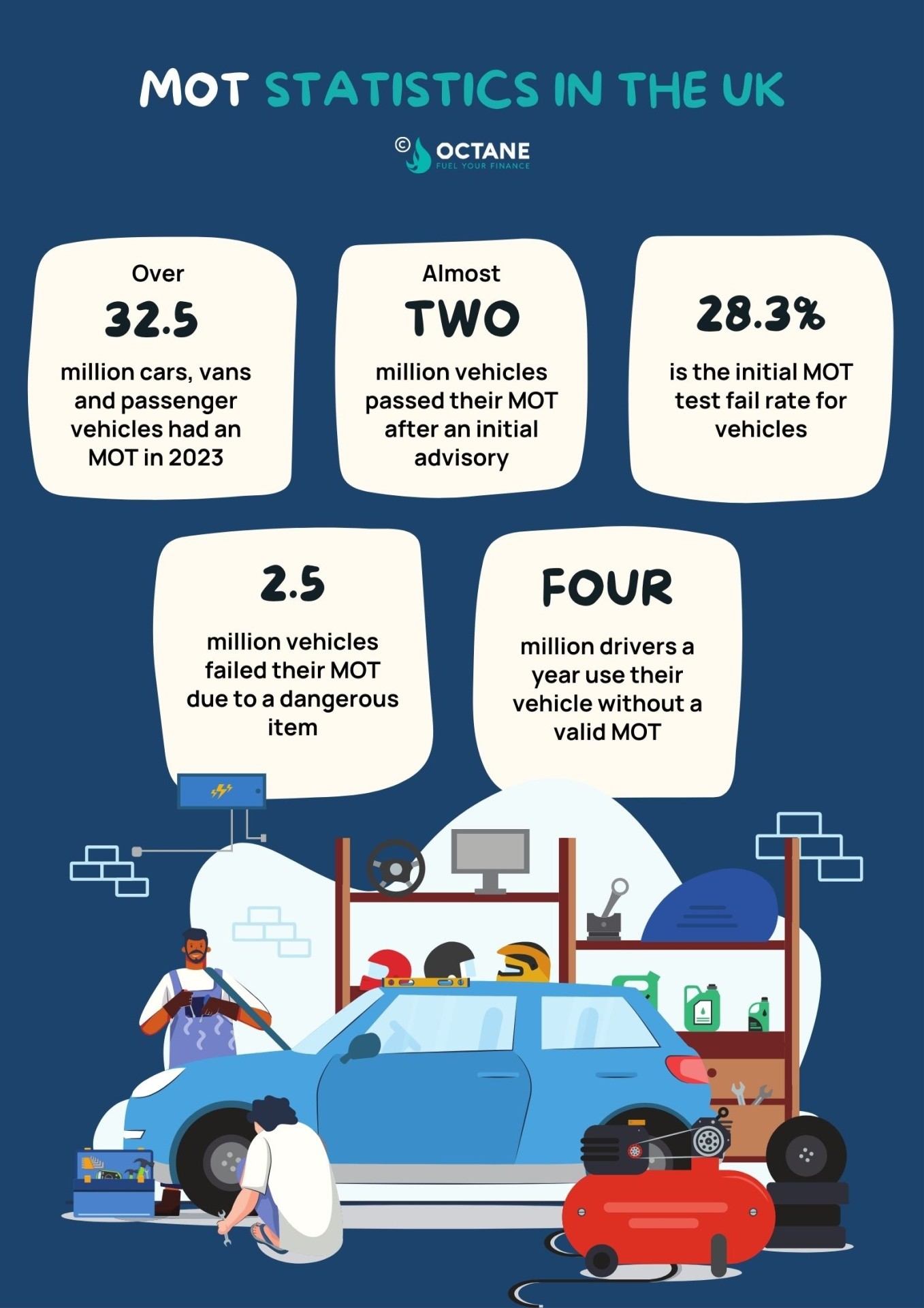MOT tests may be extended to every two years
Plans to push back MOTs to every other year have been panned
In a bid to find ways to ease the growing cost of living, the Government has shone the spotlight on the automotive industry in a potentially controversial move.
Transport Secretary Grant Shapps announced in April 2022 that annual MOT tests could be extended to every two years under new laws. But would this change really make a dent to the cost of living crisis? The maximum cost of an MOT for a car is legally set at £54.85, so motorists could expect to save around £50 a year, is it worth the negative effects?
Under current UK laws, MOTs last for up to one year and cannot be extended past a 12 months period. Here at Octane Finance, we discuss if MOTs should be extended to every two years by looking at the benefits, whilst recognising the risks too…
2024 update:
MOT test frequency remains unchanged as Government scraps two-year proposal
The UK Government has announced that MOT tests will continue with their current annual frequency following a comprehensive year-long review. This decision effectively cancels previous plans that could have extended the interval between tests to two years and pushed a vehicle's first test back to four years after the initial purchase.
Initially, the proposal aimed to overall the MOT system, making it "fit for the future." At the time, Government officials had even suggested that extending the test intervals would not compromise road safety, citing "major developments in vehicle technology" as a key factor.
Additionally, the proposed changes were estimated to save UK motorists approximately £100 million annually in combined fees, but MOT garages would be set to lose millions if the changes were to go ahead.
The Government's analysis supporting the initial proposal highlighted that the number of casualties in car collisions attributed to "vehicle defects" has remained consistently low. However, despite these findings, the decision has been made to maintain the current MOT testing schedule.
This outcome suggests that other factors, possibly including public opinion, industry feedback, or further safety considerations, may have influenced the final decision for things to remain as they are. As such, motorists should continue to follow the existing MOT test requirements for their vehicles, which is a legal requirement.
Key takeaways:
- In 2022, the UK Government announced that MOT tests could be extended to every two years
- In 2024, it has been confirmed that MOT tests will remain an annual requirement
- New vehicles over 3 years old are required to have an annual MOT test
- Motorists can be fined up to £1,000 if found driving a vehicle without an MOT
- The maximum fee that can be charged for a car MOT is £54.85 (correct as of August 2024)
- The average price for an MOT in the UK is £43.68
- VAT is not charged on MOTs
MOT statistics:
Have you ever wondered how many cars fail their MOT each year, or how many people drive in the UK without an MOT? Our MOT stat graphic* below may leave you surprised!

- In 2023, a total of 32,543,026 class 3 vehicles (these are cars, vans, and passenger vehicles with up to 12 seats) had an MOT test
- 1,943,993 of these vehicles passed their MOT test after having an initial advisory
- However, a whopping 7,290,101 vehicles failed their MOT test making the initial fail rate come in at 28.38%
- Of those vehicles that failed, 2,508,791 were due to at least one dangerous item
- It is estimated that around 4 million drivers a year use their vehicle without a valid MOT
*Source: GOV.UK Driver & Vehicle Standards Agency department.
What is an MOT?
An MOT (Ministry of Transport test) is a legal requirement for all cars driven on UK roads. Any vehicle over three years old, and less than 40 years old, must undergo an annual MOT.
The point of an MOT is to ensure that all cars driven on UK roads are safe for both their drivers and other road users. An MOT also checks that your car meets current environmental standards.
Vehicles that fail their MOT must make the necessary repairs before being allowed back on the road. You can be fined up to £1,000 if you do not have a valid MOT, so skipping one can cost you dearly.
In February 2021, new MOT regulations were introduced which set stricter rules for MOT tests; these include updates to the MOT inspection manual across a wide range of sections. One of the biggest changes to MOTs in recent years is to ensure that tyres aged over 10 years are banned from being used on heavy vehicles and minibuses.
Can you MOT a car early?
Even though you’re unable to extend your MOT past the 12 months at present, you can in fact book in your car for its MOT up to one month earlier than its due - minus one day! For example, if your vehicle’s MOT is due on the 20th June then the earliest date you can book it in would be the 21st May.
What are the benefits of extending an MOT to every two years?
Whilst a potentially controversial decision, there are a couple of benefits to extending an MOT to every two years:
- MOT costs would be spread over two years instead of one, reducing the fee to around £25 per year.
- Motorists would be saved the inconvenience of booking an annual appointment at their local garage, and having their car off the road for a period of time.
What are the risks of extending an MOT to every two years?
By comparison, the risks of extending an MOT to every two years far outweighs the benefits. Below, we explain more…
Extending the MOT period may make it more difficult for motorists to keep track of when their MOT is due. Fortunately, many garages send MOT reminder letters to their regular customers. However, other risks are not so easily negated.
There are fears that an MOT extension would lead to more unroadworthy vehicles being driven on UK roads. According to the Driver and Vehicle Standards Agency (DVSA), there are already a high number of MOT failures each year.
Did you know that 29.5% of small cars and vans failed their initial MOT test in 2021? This is quite a substantial figure. More worrying still, 8% of these failures were due to ‘dangerous’ faults. If these dangerous issues had not been spotted by an annual MOT, then in theory we could see around 2,476,415 unsafe vehicles on the roads - that really puts things into perspective!
As well as major issues, an MOT also reports on minor faults. If these minor faults are not noticed quickly enough, they could end up becoming major faults. As well as being far more dangerous, major faults are more expensive to fix too.
New cars will be affected too, as the Government’s plans mean that owners would wait until four years to have their first MOT, instead of the current three years rule. This could mean that potential problems are missed, leading to even bigger servicing bills.
Why is the Government proposing to change MOTs to every two years?
Ultimately it comes down to the costs for motorists who really are paying the price. In 2022, fuel prices hit an all-time high and although these dropped at the beginning of 2023, prices are set to climb once again…
The UK is in the midst of a cost of living crisis where we find ourselves paying over the odds for life's essentials. Households that own more than one vehicle would of course benefit financially by extending MOTs from annually to every other year.
A consultation on the proposed changes to MOTs is also being prompted by the growing demand for hybrid and fully electric vehicles, and how adaptations should be made to facilitate advances in EV technology. As it stands, just like with petrol and diesel powered cars and vans, electric vehicles require an annual MOT by law once they are three years old.
But it’s not the first time this option has been considered; in 2016 the Department of Transport opened an initial consultation on the topic of first-time MOT tests being extended from three years to four years. However, the brakes were put on the idea due to safety implications.
The new consultation for 2023 is again opening up the conversation as to whether or not the period for vehicles requiring an MOT for the first time should be extended from three years to four - or even five - years, and if it is appropriate enough to move the testing process from annually to every two years. The first consultation period runs from 18th January 2023 until 22nd March 2023.
What do industry experts say?
The best way to understand the possible impact of an MOT extension proposal is to hear what industry experts have to say. You’ll see below that their views seem fairly conclusive…
Nicholas Lyes, RAC head of policy, says: “The purpose of an MOT is to ensure vehicles meet a basic level of safety for driving on our roads. Shifting it from annually to every two years would see a dramatic increase in the number of unroadworthy vehicles and could make our roads far less safe.”
Stuart James, chief executive of the Independent Garage Association (IGA), says: “This proposal will also fail to save motorists any money long-term as defects will go unnoticed for longer, which at best will cause more damage to vehicles and increase repair costs, and at worst cause unnecessary breakdowns and accidents.”
Jack Cousens, head of roads policy at the AA, says: “Though well intended, moving the yearly £55 spend on an MOT to every two years could make costs worse for drivers with higher repair bills, make our roads more dangerous and would put jobs in the garage industry at risk.”
Here at Octane Finance, we agree that by extending an annual MOT test to every two years it will prove detrimental to motorists overall. In our opinion, the best way for the Government to help drivers during the cost of living crisis is to dramatically reduce fuel prices and introduce a price cap to further protect motorists.
We’ll of course keep you updated with how the 2023 MOT extension consultation progresses. In the meantime, if you’re keeping a closer eye on your annual motoring costs, then read our blog all about how much the average car costs to run per year, and find out how you can cut fuel costs by switching to an electric car.

